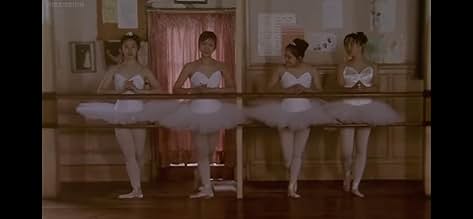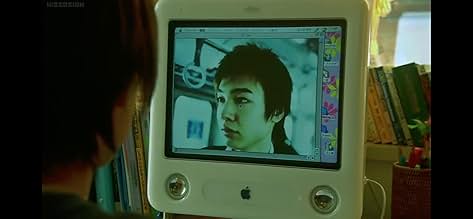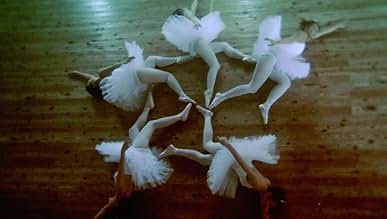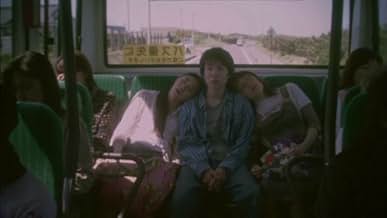IMDb-BEWERTUNG
7,2/10
5228
IHRE BEWERTUNG
Füge eine Handlung in deiner Sprache hinzuWhen two best friends develop a crush on the same boy, they develop a plan to trick him into dating them.When two best friends develop a crush on the same boy, they develop a plan to trick him into dating them.When two best friends develop a crush on the same boy, they develop a plan to trick him into dating them.
- Auszeichnungen
- 1 wins total
Empfohlene Bewertungen
Near the end of Mike Leigh's Vera Drake (trivial spoiler about Vera Drake but not about Hana and
), Imelda Staunton's Vera stands accused, caught, guilty. For what seems an eternity of fictional if not real time, before an ever-expanding body of those-who-know, she displays, in her eyes and quivery cheeks and chin, her shame. Shame's a fluid thing, grows, changes as one's conscience, if that's what it is, reaches about for new embarrassment on which to feed, and so is Vera's face in these scenes ever-changing. Time races, falls with a dreadful weight, but at the same instant it stops dead. Such embarrassments eventually slip our minds. Everyday rote erases them. We banish, delete, forget them, as well as we can, but they never exactly end. Each moment itself is something like eternal.
Elsewhere I've remarked the map-ability of Iwai's films: Uchiage hanabi, shita kara Miruka? Yoko kara Miruka? (1993) with both it's title conundrum and the on-the-road debarkation point for the alternate endings; April Story with its out-of-place fly casting; Love Letter in which doppelganger heroines overlap in space but never meet; Picnic whose protagonists walk the top edge of a wall that miraculously traverses their city; Yentown where the map one lives represents one's caste. Lily Chou Chou I haven't found time yet to re-watch and digest, but its characters travel, both locally and afar to that "Disney Jungle Ride" bit, and its concert throng near the end moves in a single direction that killer moves against. Motion needs map-able space. Iwai playing a film "director," in Hideyaki Anno's Ritual, walks/strolls/travels into and through the story and the maybe-mad girl's space. Undo has none of this. You hardly know where one set is in relation to another, as if linear space has collapsed into Moemi's bindings.
In Hana and Alice as in Undo, only the protagonists connect sets: trains, school, parkland, dance floor, etc. If anything in it is map-able, it's the two girls', and deadpan Miyamoto's, faces. Whether she's scheming, at a loss, or caught, Hana's face quivers with unceasing thought, at least as credibly and no less momentously than Vera caught. Like many liars, Hana thinks too much. She hasn't mastered yet the art of not thinking, seems not to realize the ease and simplicity of truth-telling. We see, much more often than hear, what Hana is thinking. Though the film's full of music, Hana's pre-verbal, or anti-verbal, thoughts reach us as if in dead silence, in what sounds like silent-film silence. Iwai's camera and his choice of close-ups of both girls suggest he knows this. I imagine Iwai cast Suzuki as Hana because of this silent ability. She'd displayed it to less merit in Returner. Aoi plays Alice less externally, or at least less facially. (My terminology's confusing. Alice is more of an introvert, perhaps, so uses body language which is external. But her face, early on, reveals less.) Note her mime-like dance in the animal suit: She slowly, magically reenters Hana's and our perception. At first Hana and we, for Hana, don't know whether to be annoyed. Is it one of those annoying stalking mimes? Is it sane?
Besides in faces, map Hana and Alice in Time. Amnesia's about losing Time, time already used, already spent, used up, gone, and so wasted if not remembered. The plot's machinations, Miyamoto's beyond-belief credibility, his in and out, on and off belief in the branchings of Hana's out-of-control lie, bend Time. Hana hands him a past, a chunk of time, then implicates Alice in yet another. Riding Hana's materialized daydream, Miyamoto travels to and fro, back and fore, but not in space. Hana and Alice is Iwai's La jetée.
But guess what! The film is hilarious. I can't think offhand of another film as simultaneously pictorial, euphonious, and simply funny. The humor is anything but situational. It has the warming reality of the everyday, of things and people we all know, because it transpires in the two girls cheeks, brows, and eyes.
There was a temptation to call H & A All About Lily Chou Chou's light antithesis. I don't feel that, choose not to. For touch points, besides La jetée and silent film, look maybe to Shakespeare's comedies, maybe even to his noisome clowns.
Elsewhere I've remarked the map-ability of Iwai's films: Uchiage hanabi, shita kara Miruka? Yoko kara Miruka? (1993) with both it's title conundrum and the on-the-road debarkation point for the alternate endings; April Story with its out-of-place fly casting; Love Letter in which doppelganger heroines overlap in space but never meet; Picnic whose protagonists walk the top edge of a wall that miraculously traverses their city; Yentown where the map one lives represents one's caste. Lily Chou Chou I haven't found time yet to re-watch and digest, but its characters travel, both locally and afar to that "Disney Jungle Ride" bit, and its concert throng near the end moves in a single direction that killer moves against. Motion needs map-able space. Iwai playing a film "director," in Hideyaki Anno's Ritual, walks/strolls/travels into and through the story and the maybe-mad girl's space. Undo has none of this. You hardly know where one set is in relation to another, as if linear space has collapsed into Moemi's bindings.
In Hana and Alice as in Undo, only the protagonists connect sets: trains, school, parkland, dance floor, etc. If anything in it is map-able, it's the two girls', and deadpan Miyamoto's, faces. Whether she's scheming, at a loss, or caught, Hana's face quivers with unceasing thought, at least as credibly and no less momentously than Vera caught. Like many liars, Hana thinks too much. She hasn't mastered yet the art of not thinking, seems not to realize the ease and simplicity of truth-telling. We see, much more often than hear, what Hana is thinking. Though the film's full of music, Hana's pre-verbal, or anti-verbal, thoughts reach us as if in dead silence, in what sounds like silent-film silence. Iwai's camera and his choice of close-ups of both girls suggest he knows this. I imagine Iwai cast Suzuki as Hana because of this silent ability. She'd displayed it to less merit in Returner. Aoi plays Alice less externally, or at least less facially. (My terminology's confusing. Alice is more of an introvert, perhaps, so uses body language which is external. But her face, early on, reveals less.) Note her mime-like dance in the animal suit: She slowly, magically reenters Hana's and our perception. At first Hana and we, for Hana, don't know whether to be annoyed. Is it one of those annoying stalking mimes? Is it sane?
Besides in faces, map Hana and Alice in Time. Amnesia's about losing Time, time already used, already spent, used up, gone, and so wasted if not remembered. The plot's machinations, Miyamoto's beyond-belief credibility, his in and out, on and off belief in the branchings of Hana's out-of-control lie, bend Time. Hana hands him a past, a chunk of time, then implicates Alice in yet another. Riding Hana's materialized daydream, Miyamoto travels to and fro, back and fore, but not in space. Hana and Alice is Iwai's La jetée.
But guess what! The film is hilarious. I can't think offhand of another film as simultaneously pictorial, euphonious, and simply funny. The humor is anything but situational. It has the warming reality of the everyday, of things and people we all know, because it transpires in the two girls cheeks, brows, and eyes.
There was a temptation to call H & A All About Lily Chou Chou's light antithesis. I don't feel that, choose not to. For touch points, besides La jetée and silent film, look maybe to Shakespeare's comedies, maybe even to his noisome clowns.
Hana and Alice are good friends and they do everything together. They go to the same high school and they go to school together. One day Hana falls in love with a boy who goes to the same high school. Hana deceives the boy and gets him. However, the boy loves Alice and Alice also loves him. What will happen to the relationship of the three.
I have a lot of friends but I don't have friends like Hana and Alice. They are always together and they say everything each other. They look happy and I think it is good thing. However friends sometimes become rivals. In this movie, Hana and Alice love the same man and they become rivals each other. I think moderate distance is important. We can share glad feeling or sad experience with our friends, but not interfere deeply. By watching this movie, we can rethink about the relationships with our friends.
I have a lot of friends but I don't have friends like Hana and Alice. They are always together and they say everything each other. They look happy and I think it is good thing. However friends sometimes become rivals. In this movie, Hana and Alice love the same man and they become rivals each other. I think moderate distance is important. We can share glad feeling or sad experience with our friends, but not interfere deeply. By watching this movie, we can rethink about the relationships with our friends.
From the dark world of junior high school boys in "All about Lily Chou-chou", Iwai has shifted to the lighter world of two high school girls.
Hana and Alice are best friends who do everything together. Alice is the leader of the pair, so it is no surprise when Hana follows her on an early morning expedition to the train station where Alice's latest crush gets the train in to school. Alice soon tires of her crush, but Hana meanwhile has fallen for the crush's "younger brother" Miyamoto and continues the trek to the station by herself.
When the two matriculate at the high school that Miyamoto already attends, Hana enters the rakugo (traditional comedic storytelling) club of which Miyamoto is one of two members. And when one day Miyamoto takes a nasty blow to the head she enters into a crazy scheme to get him to fall in love with her.
Alice, meanwhile, has troubles of her own dealing with a flighty mother, a father she rarely sees, and trying to find herself through a series of acting and modeling auditions after being scouted on the streets of Tokyo. And when she gets roped in to Hana's scheme she finds that Miyamoto is falling for her instead, and her relationship with Hana may be threatened.
The two main characters are real and appealing, neither is one-dimensional. Miyamoto is less interesting, and his motivation less clear. The visuals, as usual, are beautiful especially the frozen fields, cherry blossom lanes, and the ballet scenes. Music always plays an important part in Iwai films (especially Swallowtail and Lily Chou-chou), and the music in this one is very good (composed this time by Iwai himself)... but there are points where it is hard to tell which is the focus, the music or the story. Sometimes it seems that the movie is there to complement the music, and not the other way around.
Also the story has a tendency to wander, and may seem long to someone looking for a straight forward love/friendship story.
Personally I enjoyed the film... and found it got better on repeated viewings... I found Aoi Yu and Suzuki Anne very easy to relate to, recalling the confusion, insecurities, etc of high school days. It is one of Iwai's more comedic pieces, and at the same time subtly moving. It was not overly simplistic or clear cut. And I especially enjoyed Aoi's ballet solo toward the end of the film (both for the solo itself and it's place in the story) I think that fans of Iwai's style will enjoy it.
Keep an eye out for the many cameos (Hirosue Ryoko (of ARITA), Osawa Takao (of Lily Chou-chou), Ito Ayumi (of Swallowtail and Lily Chou-chou)... Abe Hiroshi, Yoshioka Hidetaka (voice only)... and many others)
Hana and Alice are best friends who do everything together. Alice is the leader of the pair, so it is no surprise when Hana follows her on an early morning expedition to the train station where Alice's latest crush gets the train in to school. Alice soon tires of her crush, but Hana meanwhile has fallen for the crush's "younger brother" Miyamoto and continues the trek to the station by herself.
When the two matriculate at the high school that Miyamoto already attends, Hana enters the rakugo (traditional comedic storytelling) club of which Miyamoto is one of two members. And when one day Miyamoto takes a nasty blow to the head she enters into a crazy scheme to get him to fall in love with her.
Alice, meanwhile, has troubles of her own dealing with a flighty mother, a father she rarely sees, and trying to find herself through a series of acting and modeling auditions after being scouted on the streets of Tokyo. And when she gets roped in to Hana's scheme she finds that Miyamoto is falling for her instead, and her relationship with Hana may be threatened.
The two main characters are real and appealing, neither is one-dimensional. Miyamoto is less interesting, and his motivation less clear. The visuals, as usual, are beautiful especially the frozen fields, cherry blossom lanes, and the ballet scenes. Music always plays an important part in Iwai films (especially Swallowtail and Lily Chou-chou), and the music in this one is very good (composed this time by Iwai himself)... but there are points where it is hard to tell which is the focus, the music or the story. Sometimes it seems that the movie is there to complement the music, and not the other way around.
Also the story has a tendency to wander, and may seem long to someone looking for a straight forward love/friendship story.
Personally I enjoyed the film... and found it got better on repeated viewings... I found Aoi Yu and Suzuki Anne very easy to relate to, recalling the confusion, insecurities, etc of high school days. It is one of Iwai's more comedic pieces, and at the same time subtly moving. It was not overly simplistic or clear cut. And I especially enjoyed Aoi's ballet solo toward the end of the film (both for the solo itself and it's place in the story) I think that fans of Iwai's style will enjoy it.
Keep an eye out for the many cameos (Hirosue Ryoko (of ARITA), Osawa Takao (of Lily Chou-chou), Ito Ayumi (of Swallowtail and Lily Chou-chou)... Abe Hiroshi, Yoshioka Hidetaka (voice only)... and many others)
Hana and Alice are best friends about to enter high school. One day, they see Masashi, a boy about their age, on board a train. Alice develops a crush on him, though it is but a passing fad. For Hana, it is something more serious, and she begins to shadow Masashi, determined to make him her boyfriend. After he has an accident, Hana convinces him he has amnesia, and has forgotten that they are a couple. Matters are complicated further when Hana makes Alice pretend to be his ex-girlfriend; and further still when Alice and Masashi fall for each other. In the face of such drama, can Hana and Alice's friendship last?
Subtle and moving, Shunji Iwai's 'Hana and Alice' is a deceptively simple comic-drama speaking depths about the human condition. It is a striking picture, the subtly strong narrative of which is all the more incredible when one considers it began life as four short films celebrating the 30th anniversary of Nestlé's Kit Kat chocolate bar in Japan. A poignant character study, examining the personalities of two complex girls, Iwai's characterisation is rich and full of depth.
Both Hana and Alice are multifaceted, layered characters, with ambitions, faults and secrets. Though not immoral or unempathetic, they are not above using others to get their own way. Through Iwai's nuanced storytelling, a vividly realistic portrayal of these two characters is created. Manipulative, but charming, they are compelling, realistic cinematic creations, with fascinating backstories; and their tale is engaging.
Throughout the film, their friendship is put to the test. Iwai uses them to make a larger point about the importance of friendship, especially during one's formative years. He also delves into the complexities of youth, displaying great insight into the adolescent mindset. Hana and Alice are on the cusp of adulthood, a strange time when one re-examines one's life, readjusting priorities. Both Hana and Alice struggle; trying to act like adults, while suffering from a dearth of positive role models.
Alice's mother is far too concerned with her own romantic entanglements, while her father is distant and awkward. Hana's mother, meanwhile, seems disconnected from her daughter, focused on her work. At one point, she addresses Masashi as Hana, seemingly not recognising that he isn't, in fact, her daughter. It is no wonder that Hana and Alice create fabulous lies when they have no-one offering them guidance.
It is an affecting picture, not to mention a funny one. Iwai's dialogue is witty and many sequences will have viewers- possessed of a certain sense of humour- grinning from ear to ear. Additionally, it is a strikingly shot film, containing artful cinematography from Noboru Shinoda. His muted work is couched in the traditions of realism, yet has a certain stylized edge to it. It is as if the film were shot as a reflection of life in a carnival hall of mirrors; visuals projecting a slightly heightened version of reality, carrying much emotional weight.
The mournful score, from Iwai himself, doesn't just complement these visuals; it heightens them, compounding their dramatic power. Further, it is well-edited film, with Iwai establishing a steady pace from the beginning. Although some criticise it as being overlong, even at two hours and fifteen minutes, in the company of Hana and Alice, time flies.
Anne Suzuki and Yu Aoi star as Hana and Alice, respectively, delivering two remarkable performances of depth, wit and nuance. Whether delivering impassioned monologues- as Suzuki does masterfully in the latter half- or performing ballet- like Aoi, beautifully, in the last act- both of them impress greatly. They'll have you laughing and crying in equal measure. Alongside them, Tomohiro Kaku does fine work as Masashi, while Sei Hiraizumi is great as Alice's father, in a solitary- but memorable- scene.
A compelling character study, Shunji Iwai's 'Hana and Alice' offers viewers a profound meditation on the complexities of youth, friendship and love. Funny and sad both, its narrative- and the characters involved- are engaging, while the cinematography and score are memorably striking. Strongly acted- especially by stars Anne Suzuki and Yu Aoi- it is a heartfelt and heartrending comic-drama that is well worth a watch.
Subtle and moving, Shunji Iwai's 'Hana and Alice' is a deceptively simple comic-drama speaking depths about the human condition. It is a striking picture, the subtly strong narrative of which is all the more incredible when one considers it began life as four short films celebrating the 30th anniversary of Nestlé's Kit Kat chocolate bar in Japan. A poignant character study, examining the personalities of two complex girls, Iwai's characterisation is rich and full of depth.
Both Hana and Alice are multifaceted, layered characters, with ambitions, faults and secrets. Though not immoral or unempathetic, they are not above using others to get their own way. Through Iwai's nuanced storytelling, a vividly realistic portrayal of these two characters is created. Manipulative, but charming, they are compelling, realistic cinematic creations, with fascinating backstories; and their tale is engaging.
Throughout the film, their friendship is put to the test. Iwai uses them to make a larger point about the importance of friendship, especially during one's formative years. He also delves into the complexities of youth, displaying great insight into the adolescent mindset. Hana and Alice are on the cusp of adulthood, a strange time when one re-examines one's life, readjusting priorities. Both Hana and Alice struggle; trying to act like adults, while suffering from a dearth of positive role models.
Alice's mother is far too concerned with her own romantic entanglements, while her father is distant and awkward. Hana's mother, meanwhile, seems disconnected from her daughter, focused on her work. At one point, she addresses Masashi as Hana, seemingly not recognising that he isn't, in fact, her daughter. It is no wonder that Hana and Alice create fabulous lies when they have no-one offering them guidance.
It is an affecting picture, not to mention a funny one. Iwai's dialogue is witty and many sequences will have viewers- possessed of a certain sense of humour- grinning from ear to ear. Additionally, it is a strikingly shot film, containing artful cinematography from Noboru Shinoda. His muted work is couched in the traditions of realism, yet has a certain stylized edge to it. It is as if the film were shot as a reflection of life in a carnival hall of mirrors; visuals projecting a slightly heightened version of reality, carrying much emotional weight.
The mournful score, from Iwai himself, doesn't just complement these visuals; it heightens them, compounding their dramatic power. Further, it is well-edited film, with Iwai establishing a steady pace from the beginning. Although some criticise it as being overlong, even at two hours and fifteen minutes, in the company of Hana and Alice, time flies.
Anne Suzuki and Yu Aoi star as Hana and Alice, respectively, delivering two remarkable performances of depth, wit and nuance. Whether delivering impassioned monologues- as Suzuki does masterfully in the latter half- or performing ballet- like Aoi, beautifully, in the last act- both of them impress greatly. They'll have you laughing and crying in equal measure. Alongside them, Tomohiro Kaku does fine work as Masashi, while Sei Hiraizumi is great as Alice's father, in a solitary- but memorable- scene.
A compelling character study, Shunji Iwai's 'Hana and Alice' offers viewers a profound meditation on the complexities of youth, friendship and love. Funny and sad both, its narrative- and the characters involved- are engaging, while the cinematography and score are memorably striking. Strongly acted- especially by stars Anne Suzuki and Yu Aoi- it is a heartfelt and heartrending comic-drama that is well worth a watch.
Iwai's tale of friendship and love among 15-year-olds is a bitter-sweet affair, joyous and poignant in fragments. It is not a perfect film, but still imbued with enough of Iwai's visual flair and inventiveness to raise it above much of what Japan has offered up in the first decade of the 21st century.
Hana (Anne Suzuki) is inadvertently brought to Ma-kun by her best friend Alice (Yû Aoi). She utilizes an accident to convince clumsy Ma-kun (Tomohiro Kaku) that he has lost his memory and that she is the love of his life. The lie grows out of control, and sucks in the best friend. Alice, meanwhile, has her own troubles to contend with, namely an eccentric mother, disinterested father, and an acting/modeling opportunity that continually misfires.
Like Iwai's 'Love Letter', the essentials of the plot are intricately laid out, but ultimately matter less than the shot-by-shot, scene-by-scene poetry conjured up by camera, light and direction. There is one breathtaking shot in a classroom, when Astro Boy is revealed watching brazenly over a lover's tiff. The manga motif serves to underline the heightened emotions and extreme dramatics of the tale. Similar optical playfulness is employed when Hana watches Ma-kun on the train, seemingly in conversation with his girlfriend. That shot is matched later when we are optically fooled into thinking Ma-kun will kiss Alice. It is this continual ability to surprise and delight that means the 2-hour plus running time, while self-indulgent, manages not to feel too much of an imposition.
There are some wonderful set pieces to celebrate here. Alice's father making a complete mess of gifting his daughter a fountain pen is painful and hilarious. Ditto Hana's mother appearing in her undies before a shell-shocked Ma-kun. A klutzy classmate's photos of the girls in ballet tutus turn out to be magical. These scenes, stagy and contrived in the hands of a lesser mortal, are fluid, vivid and delightful when presented by Iwai.
It is testament to Iwai's genius that a host of A-listers line up for walk-on parts in this film. For example, Hirsohi Abe, used to playing leads, is practically an extra here when he shows up as the boyfriend of Alice's mum. What other living director elicits such reverence? Hana and Alice glows, quite literally. The film captures that vividness of passionate friendships and love first encountered that only the qualia of a 15-year-old knows. Ultimately, the running time is a shade too flabby to count it among Iwai's masterpieces (the plural is deliberate), but this is a subtle, complex film worthy of repeat viewing.
Hana (Anne Suzuki) is inadvertently brought to Ma-kun by her best friend Alice (Yû Aoi). She utilizes an accident to convince clumsy Ma-kun (Tomohiro Kaku) that he has lost his memory and that she is the love of his life. The lie grows out of control, and sucks in the best friend. Alice, meanwhile, has her own troubles to contend with, namely an eccentric mother, disinterested father, and an acting/modeling opportunity that continually misfires.
Like Iwai's 'Love Letter', the essentials of the plot are intricately laid out, but ultimately matter less than the shot-by-shot, scene-by-scene poetry conjured up by camera, light and direction. There is one breathtaking shot in a classroom, when Astro Boy is revealed watching brazenly over a lover's tiff. The manga motif serves to underline the heightened emotions and extreme dramatics of the tale. Similar optical playfulness is employed when Hana watches Ma-kun on the train, seemingly in conversation with his girlfriend. That shot is matched later when we are optically fooled into thinking Ma-kun will kiss Alice. It is this continual ability to surprise and delight that means the 2-hour plus running time, while self-indulgent, manages not to feel too much of an imposition.
There are some wonderful set pieces to celebrate here. Alice's father making a complete mess of gifting his daughter a fountain pen is painful and hilarious. Ditto Hana's mother appearing in her undies before a shell-shocked Ma-kun. A klutzy classmate's photos of the girls in ballet tutus turn out to be magical. These scenes, stagy and contrived in the hands of a lesser mortal, are fluid, vivid and delightful when presented by Iwai.
It is testament to Iwai's genius that a host of A-listers line up for walk-on parts in this film. For example, Hirsohi Abe, used to playing leads, is practically an extra here when he shows up as the boyfriend of Alice's mum. What other living director elicits such reverence? Hana and Alice glows, quite literally. The film captures that vividness of passionate friendships and love first encountered that only the qualia of a 15-year-old knows. Ultimately, the running time is a shade too flabby to count it among Iwai's masterpieces (the plural is deliberate), but this is a subtle, complex film worthy of repeat viewing.
Wusstest du schon
- WissenswertesAlthough released almost 11 years before The Case of Hana & Alice (2015), this movie actually serves as the sequel.
- Zitate
Setsuko "Alice" Arisugawa: I saw 'Hannibal' on satellite last night.
Hana: So did I.
Setsuko "Alice" Arisugawa: I was scared.
Hana: Isn't he creepy?
Setsuko "Alice" Arisugawa: Yeah. Don't you think real people are scarier... than zombies and ghosts?
- VerbindungenFeatures Taiyô no ôji: Horusu no daibôken (1968)
Top-Auswahl
Melde dich zum Bewerten an und greife auf die Watchlist für personalisierte Empfehlungen zu.
- How long is Hana and Alice?Powered by Alexa
Details
Box Office
- Weltweiter Bruttoertrag
- 654.448 $
Zu dieser Seite beitragen
Bearbeitung vorschlagen oder fehlenden Inhalt hinzufügen




















